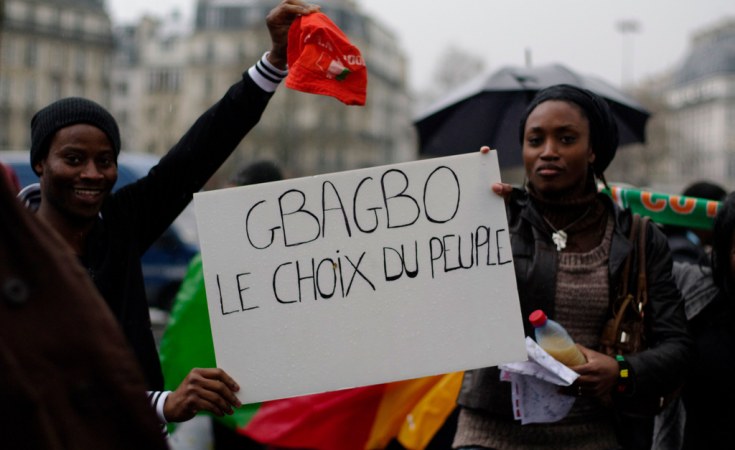Laurent Gbagbo's confirmation of charges hearing at The Hague started today. However, the ICC runs the risk of producing one-sided justice.
Laurent Gbagbo, former president of the Ivory Coast, appeared before the International Criminal Court (ICC) today at a confirmation of charges hearing, in what could prove a crucial first step in establishing accountability for the atrocities that followed the 2010 election.
Gbagbo faces four counts of crimes against humanity, and if the prosecution can demonstrate that there are "substantial grounds to believe" in his culpability, the case will advance to a full trial. Especially on the back of the recent Charles Taylor case and the start of the Hissène Habré case, this latest development has prompted some analysts to rejoice at the expanding possibilities of international justice. However, a more nuanced approach is needed.
Reductive justice
One of the criticisms of the ICC is that its approach to justice is too reductive - it often singles out one actor or trend and leaves other structural issues unaddressed.
The main focus of the investigation is the five month period following the presidential run-off in November 2010. UN election observers declared challenger Alassane Ouattara the winner. But the incumbent Gbagbo refused to accept the outcome, and loyalist forces on both sides turned to violence. The eventual death toll reached 3,000, politicians were kidnapped and murdered, and widespread violent and gender-based attacks were carried out.
But the ICC has indicated a willingness to also use findings from as far back as the armed conflict of 2002, in which pro-government forces in the south clashed with rebels in the north. Over the past few months, a crackdown against those linked to Gbagbo has gained momentum - his wife Simone and scores of Gbagbo's allies have been arrested, including the "street general" Charles Blé Goudé, who is accused of hate speech and inciting xenophobia.
Few would deny that Gbagbo is worthy of the ICC's scrutiny. However, common portrayals of the case being between a despot, a democrat and a faultless court need to be interrogated further.
Victors' justice
A UN report (available in French here) from 2011, bolstered by the outcry of NGOs, is equally critical of both sides of the conflict. Evidence has shown both sides acted inhumanely. Yet their treatment in the courts has, thus far, been vastly different.
Let's take Guillaume Soro, once branded by the BBC as "Ivory Coast's Charming Rebel", as an example. Soro, a former student leader from Abidjan, moved to Ouagadougou, the capital of neighbouring Burkina Faso, in 2000 and built up a rebel army with money from powerful backers. He launched a bloody and protracted offensive in 2002, and, in 2010 when serving as Defence Minister under Gbagbo, threatened the president with war if he didn't relinquish power.
The single largest massacre during the five months of violence happened in the western town of Duékoué. Some 800 people were killed, and Soro's Republican Forces of the Ivory Coast (FRCI) were heavily implicated as the UN called on them to show restraint after reports emerged of "serious human rights violations". Other reports have claimed that ethnic groups considered loyal to Gbagbo, such as the Guere, were specifically targeted.
But rather than being in the dock like Gbagbo and his allies, Soro is currently serving as President of the National Assembly. Meanwhile Ouattara has been praised by the international community, while only Gbagbo faces legal action.
The mask of Soro
In the course of investigations, ICC judges will be confronted by realities that will put them in a problematic position. And unless their approach is complemented by more indictments, it could prove counterproductive.
The voices of victims on both sides must be heard. The coordinator of the Ivory Coast's Coalition for the ICC, Ali Ouattara (no relation to the president), said, "Civil society in Cote d'Ivoire welcomes the ICC proceedings against Laurent Gbagbo. However, the low rate of victim participation at this stage of the proceedings is a major concern."
Francis Dako, Africa Coordinator for the Coalition for the ICC, commented, "Delays in issuing further arrest warrants will have ramifications for the Court's perceived independence and credibility. Equitable and impartial justice is essential for reconciliation in the wake of many years of conflict."
This approach has raised many concerns, not least amongst ethnic groups that have not been on Ouattara's side. One-sided justice is not justice at all. Criticism from this perspective has been forthcoming but not entirely adequate.
The current approach will considerably hinder healing the wounds after a tumultuous decade of division. It will foster mistrust on both sides. But, crucially, it will also risk reproducing rather than addressing the root causes of the fighting in the first place: if victors are allowed to escape judicial action, it could simply justify Gbagbo's win-at-all-costs attitude.
Rom Bhandari is Legal Editor at Think Africa Press. He holds an LLM from King's College, University of London. His interests include human rights and migration. Follow him on twitter @romromromTAP. Email: rom.bhandari@thinkafricapress.com


